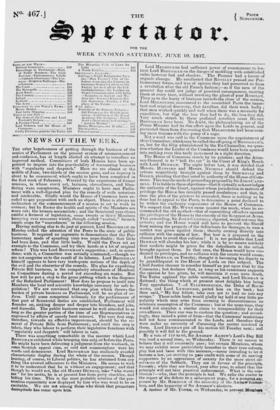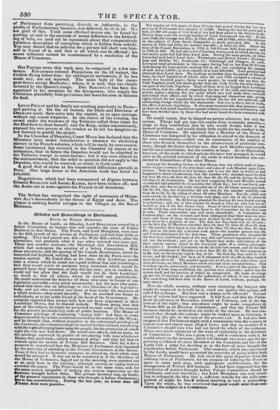NEWS OF THE WEEK.
THE utter hopelessness of getting through the business of the session of Parliament on the present system of mismanagement and confusion, has at length elicited an attempt to introduce an improved method. Committees of both Houses have been ap- pointed to inquire into the practicability of transacting business with "regularity and despatch." Here we are almost at the middle of June, two-thirds of the session gone, and an inquiry is about to be commenced, which ought to have been completed in the first week of February. Warned by the experience of former sessions, in whose every act, laziness, slovenliness, and blun- dering 'were conspicuous. Ministers ought to have met Parlia- ment with a well-digested plan for the remedy of evils notorious and intolerable. Gladly would the House of Commons have ac- ceded to tiny proposition with such an object. There is always an inclination at the commencement of a session to set to work in earnest ; but by Easter the health and spirits of the Members are worn out; the arrears accumulate ; and the Senatorial year closes amidst a ferment of legislation, sotne twenty or thirty Members hurrying over measures which, though called "routine," furnish ample scope for "amendment" in the following session. Having nothing else to do just at present, Lord BROUGHAM on Monday called the attention of the Peers to the state of public business. It required no ingenuity to demonstrate that the Par- liamentary mode of spending time was unprofitable ; that little had been done, and that little badly. 'Would the Peers set an example to the Commons, and try their hands at a bit of original reform ? This was Lord BROUGHAM'S suggestion ; and, in accor- dance with it, a Committee was actually nominated,—though we are not sanguine as to the result of its labours. Lord BROUGHAM himself appears to have very inadequate notions of the depth of the evil and the character of the remedy. His plan for expediting Private Bill business, is the compulsory attendance of Members on Committees during a period not exceeding six weeks. But how will he put a stop to the gross jobbing which is the disgrace of the Reformed Parliament? How does he propose to instil into Members the local and scientific knowledge necessary for safe le- gislation? We are convinced that any plan which throws the burden of private business on Parliament, will be no plan of re. form. Until some competent tribunals for the performance of that part of Senatorial duties are established, Parliament will flounder on, sinking deeper and deeper into blunders, and jobs, and discredit. The public business cannot be well attended to as long as the greater portion of the time of our Representatives is engrossed by affairs of merely local interest. The very first step, therefore, towards an effective improvement, should be the re- moval of Private Bills from Parliament ; and until this step is taken, they who labour to perform their legislative functions with "regularity and despatch" will labour in vain. Them was something remarkable in the manner which Lord BROUGHAM exhibited while bringing this subject before the Peers. He might have been delivering a judgment from the woolsack, in some Scottish appeal case, so cold and commonplace were his words and demeanour. Lord BROUGHAM has studiously avoided characteristic display during the whole of the session. Though leaning, of course, to Liberal politics, he has abstained from any thing like avowed adherence to the Ministers. He seems to wish it to be understood that he is without an engagement; and that though he would not, like old HARRY DUNDAS, take •• wha wants me" for his motto, he is at present free from party shackles, and buling his time. This is the most probable solution of the pas- sionless equanimity now displayed by him who was wont to be so excitable. We are not among those who think that premature decrepitude has come upon him. Lord MELBOURNE had sufficient power of countenance to lec- ture Lord BROUGHAM on the danger of meddling with established rules however bad and obsolete. The Premier had a horror of organic change. He recollected that ROMILLY praised our Par- liamentary forms, and was of opinion they had preserved us from a revolution after the old French fashion ;—as if the men of the present day could not judge of practical consequences, meeting them at every turn, without invoking the ghost of poor Roam LLY. Then as to the hurry of business towards the close of the session, Lord MELBOURNE announced to the assembled Peers the impor- tant and original discovery, that dawdlers did their work badly ; that men worked quickly and well when there was a necessity for expedition, but that the less they had to do, the less they (lid. Very much struck by these profound novelties must HENRY BROUGHAM have been. No doubt, the philosophizing air of the Prime Minister had its due effect upon the Lords in general, and prevented them from discovering that MELBOURNE had been vent- ing mere truisms with the pomp of a sage. Not a word was said in the Commons upon the appointment of their Committee; which may be called the offspring of B ao UG HA NI'S, as, but for the fillip administered by the Ex-Chancellor, we ques- tion whether the Leader of the Commons would have been spurred into making even this tardy movement in a right direction.
The House of Commons stands by its printers; and the Attor- ney-General is to " bell the cat" in the Court of King's Bench
with Lord DENMAN. The night before last, it was decided that • Messrs. HANS tRID and Messrs. IslicHots should defend the actions respectively brought against them by Smears.% LE and GREEN, pleading that they acted by authority of the House of Com- mons. This was the mode of proceeding proposed by Sir JOHN CAMP-.
BE L t. It is liable to these objections—that it virtually acknowledges
the authority of the Court, against whose jurisdiction in matters of privilege the House has recently passed resolutions; and that, in
case the plea of the printers be overruled, there is nothing to be done but to appeal to the Peers, to determine a point declared to be within the exclusive cognizance of the House of Commons. We suspect that Mr. WYNN came nearest the mark, when he re- .
commended the old method—that of committing offenders against the privileges of the House to the custody of the Sergeant-at-Arms.
This proceeding, Sir Jonst CAMPBELL objected, would not-stay the
actions; and the House would still have to prevent the Sheriff from seizing the property of the defendants for damages, in case a verdict was given against them ; thereby coming directly into collision with the courts of law. But how is it proposed on the chosen plan to avoid that collision? It is not probable that Lord
DENNIAN will abandon his law; while it is by no means unlikely
that verdicts might be given for the defendants in the action brought against them. In that case, the House would have vin- dicated its privileges, and no collision with the courts would ensue.
Lord DENMAN, on Tuesday, thought it becoming his dignity to be grandiloquent in the House of Lords on this subject. The
ChiefJustice chooses to consider himself as put upon trial by the Commons ; but declares that, as long as his conscience supports the opinion he has given, he will maintain it even unto death,
The Tories applaud the noble sentiment, and Lord DENMAN is flattered ; the thing which at present most delights him being Tory approbation. Lord ELLENBOROUGH, the Duke of RICH- MOND, and Lord LYNDHURST, patted him on the back ; but
then said," My fine fellow, take care not to lead us into any scrape." These noble lords would gladly lay hold of any little po- pularity which may arise from seeming to discountenance an arbitrary assumption of the Commons ; but at the same time, they would not abandon a similar claim to irresponsibility for their own officers. Their cue was to cushion the question ; and accord- ingly, they raised a point of form—that the Commons' resolutions had not been communicated to the Lords, and therefore they
were under no necessity of discussing the matter involved in them. Lord DENMAN put off his motion till Tuesday next ; and possibly it will fall to the ground. By a vote of 119 to'66, Sir ANDREW AGNEW'S Lord's Day Bill was read a second time, on Wednesday. There is no reason to
believe that it will eventually pass ; but certain Members, whom we may exhibit more particularly hereafter in their true colours, play fast and loose with this measure,—never intending to let it become a law, yet striving to gain credit with some of its canting supporters by an appearance of anxiety for the more strict ob- servance of the Sabbath. They are in favour of the principle, forsooth ; while they are forced, year after year, to admit that the principle will not bear practical enforcement. What is the con- clusion ?—why, that the principle is bad. We refer the reader to
the report of the debate in a subsequent page, for a pungequas posure by Mr. ROEBUCK of the absurdity of the stastowlontoo- tion, and the hypocrisy of Sir ANDREW'S abettors. 4 motion of Mr. Toopt, on Wednesday, to prevent Member* of Parliament from partaking, directly or indirectly, in the profits of Parliamentary business, was defeated, by 50 to 52. We are glad of this. Until some effectual means can be found for putting an end to the exercise of secret influence in the forward- ing of bills, we need not be squeamish about that comparatively harmless description of corruption which is hidden from nobody. You may decree that no solicitor for a private bill shall vote him- self in favour of it, and that is all which can be effected : his secret influence cannot be counteracted by a resolution of the House of Commons.



























